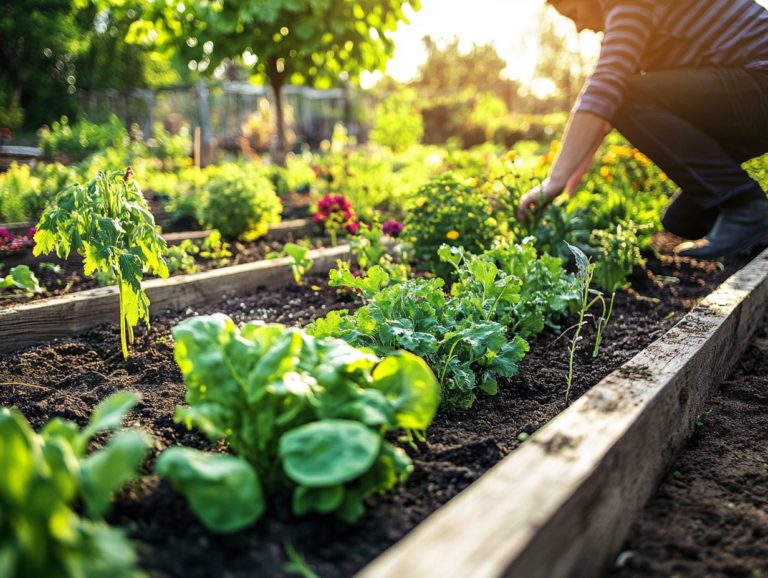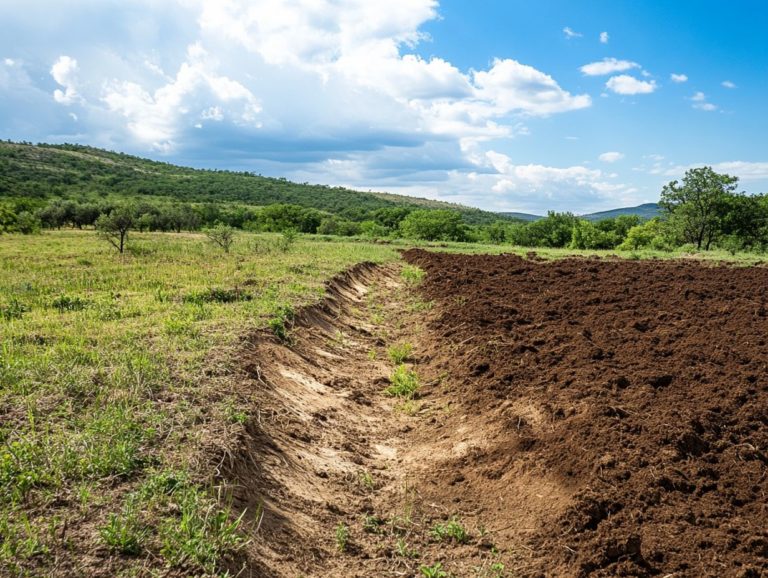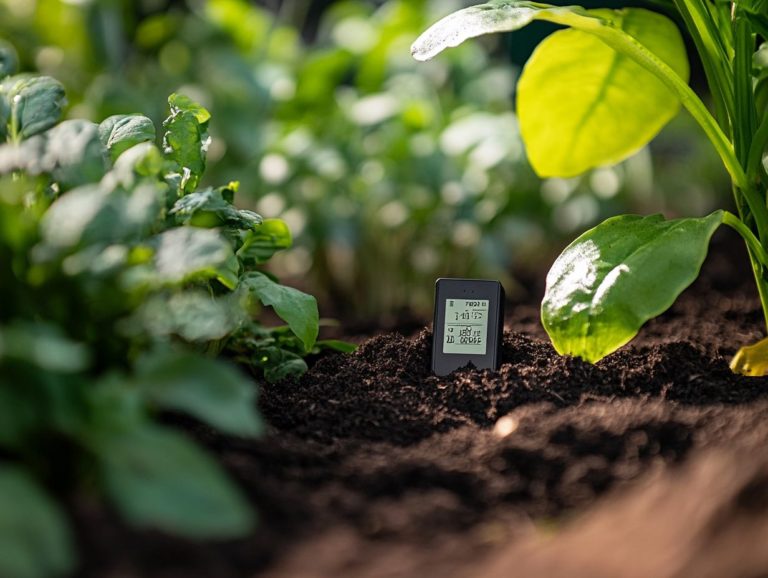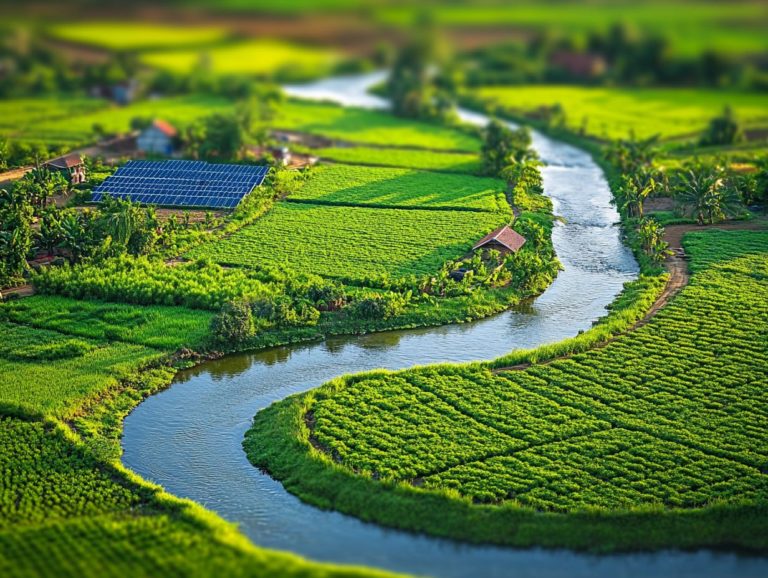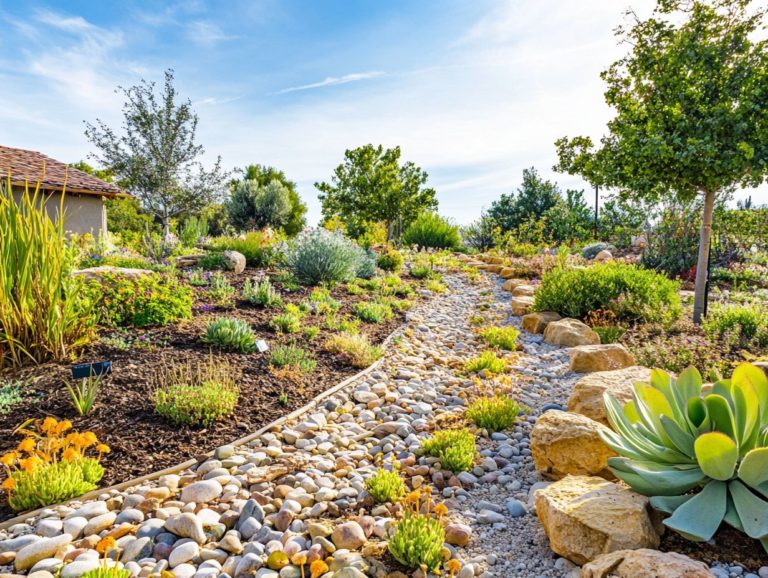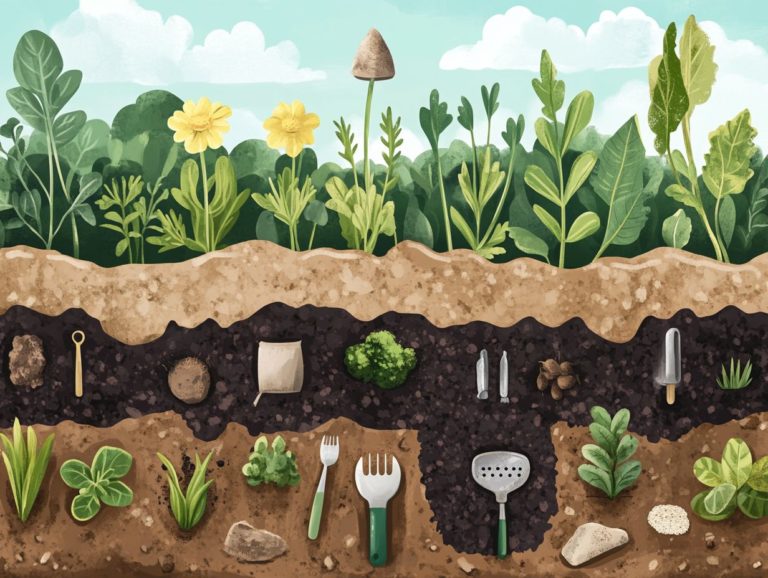How to Reduce Water Runoff in Your Garden
Water runoff stands as a notable environmental challenge, affecting both ecosystems and urban landscapes.
In your garden, effectively managing this runoff not only conserves precious water but also enhances soil health and minimizes pollution. This article delves into the significance of reducing water runoff and surface water, pinpointing common sources within your garden and presenting practical solutions such as the implementation of rain gardens and rain garden design, as well as the use of permeable pavers and concrete surfaces.
Explore best practices for selecting plants and mastering effective watering techniques to cultivate a sustainable and beautiful garden. Uncover how your efforts can lead to a positive impact!
Contents
- Key Takeaways:
- The Importance of Reducing Water Runoff
- Identifying Sources of Water Runoff in Your Garden
- Methods to Reduce Water Runoff
- Best Practices for Managing Water Runoff
- Additional Tips for Reducing Water Runoff
- Frequently Asked Questions
- Ever wonder what water runoff is and why you should care?
- How can I reduce water runoff in my garden?
- What are some landscaping techniques that can help reduce water runoff?
- What are the benefits of reducing water runoff in my garden?
- How can I tell if my garden has a problem with water runoff?
- What are some other ways I can conserve water in my garden?
Key Takeaways:
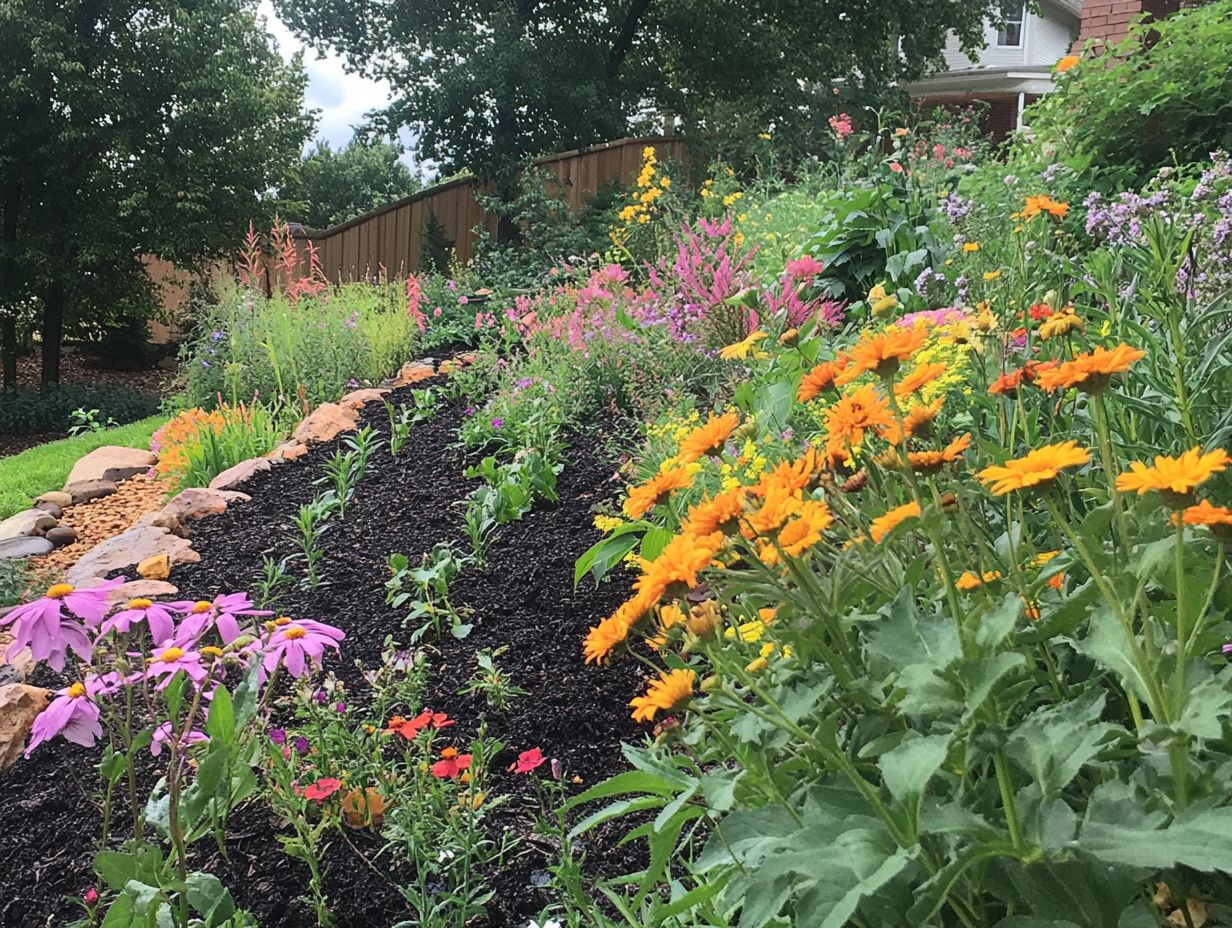
- Reducing water runoff is crucial for the environment and has many benefits.
- Implementing techniques like rain gardens, permeable paving, and rain barrels can effectively reduce water runoff.
- Proper plant selection, maintenance, and watering techniques are key for managing water runoff. Controlling erosion and using natural mulch also help!
The Importance of Reducing Water Runoff
Reducing water runoff is essential for your environmental health and urban sustainability, especially in regions susceptible to heavy rainfall, stormwater runoff, and flooding. Effective management of stormwater runoff not only alleviates drainage issues but also amplifies the ecological advantages of your landscape.
By embracing innovative solutions, you can prevent flooding, manage erosion, and enhance water retention. All of these significantly elevate the beauty and vitality of your garden and surrounding ecosystems.
Environmental Impact and Benefits
Proper runoff management is a game-changer for reducing environmental pollution and enhancing the sustainability of ecosystems.
By embracing eco-friendly pesticides like rain gardens, permeable pavements, and native plants, you can easily capture and filter rainwater before it reaches local waterways. This proactive strategy not only protects our waters but also maintains groundwater levels ensuring clean water is always available for both people and wildlife.
By minimizing runoff, you can significantly mitigate the adverse effects of soil erosion and nutrient depletion, leading to healthier soil and stronger plant growth. Ultimately, adopting these strategies fosters a cleaner environment and contributes to the overall resilience of natural habitats, reinforcing the essential connection between sustainable land management and ecosystem health.
Identifying Sources of Water Runoff in Your Garden
Identifying the sources of water runoff in your garden is crucial for implementing effective solutions for better drainage and nurturing a flourishing landscape.
Common culprits often include heavy rainfall, poor soil infiltration, and insufficient lawn aeration, which can result in waterlogged lawns and potential structural damage to your outdoor spaces.
It’s important for you to assess your garden carefully, pinpointing these drainage issues and exploring innovative methods to enhance water absorption while minimizing runoff.
Common Causes and Solutions
Common causes of water runoff in your garden often arise from poor drainage and compacted soil, which can lead to ineffective soil amendments and inadequate surface absorption.
Your landscaping choices, particularly regarding hardscaping and non-permeable materials, can significantly exacerbate runoff issues. For instance, concrete pathways and poorly positioned borders might block water from seeping into the ground, creating a problem instead of a solution.
You can tackle these challenges by incorporating native plants that are well-suited to your local conditions and generally require less water. Designing rain gardens that utilize specific plant species alongside strategically placed depressions can enhance water absorption and minimize runoff.
By understanding these underlying causes and implementing effective solutions, you can cultivate a more sustainable garden that interacts harmoniously with its environment.
Act now to create a sustainable garden!
Methods to Reduce Water Runoff
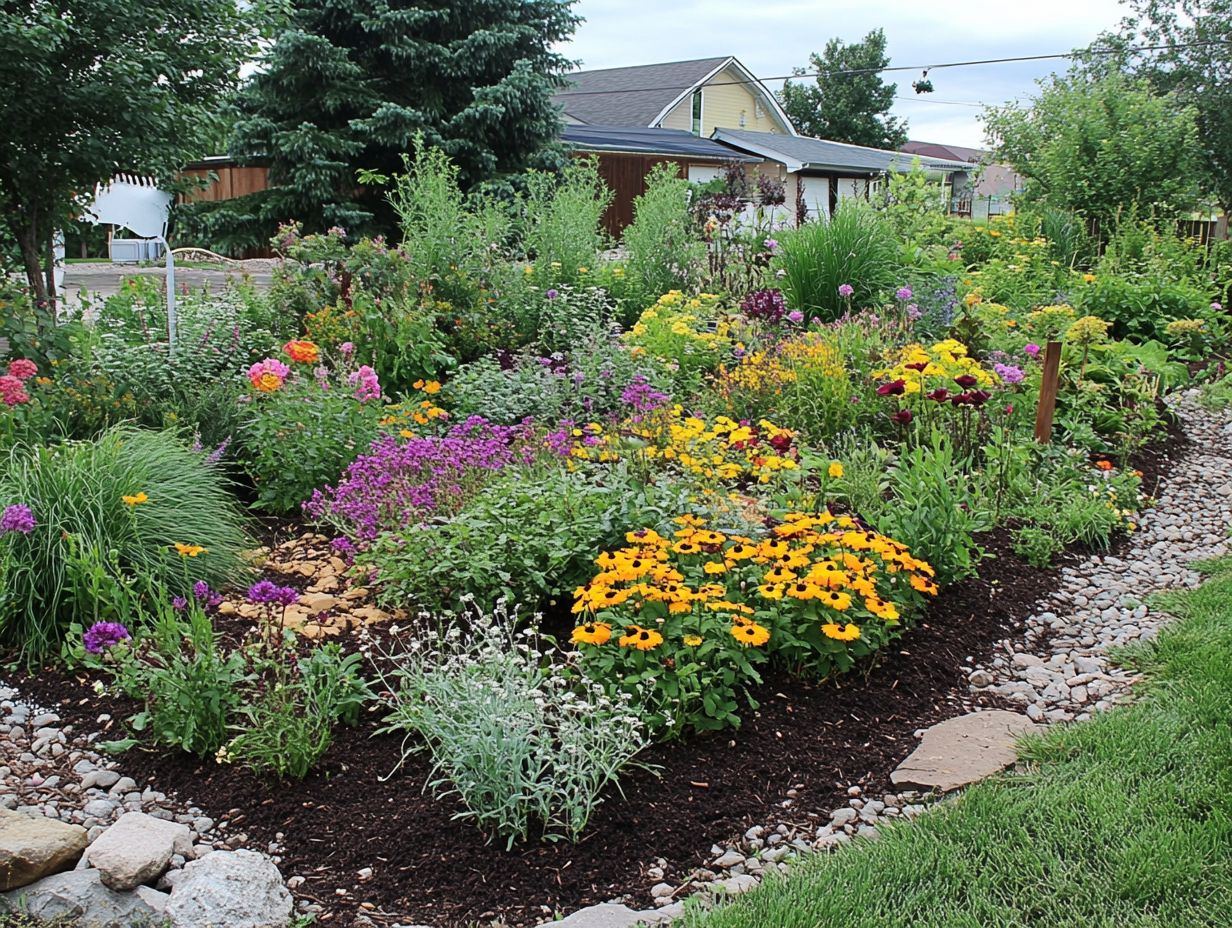
Implementing effective strategies for reducing water runoff is essential for maintaining a thriving garden and mitigating flooding in urban environments.
Techniques such as installing rain gardens, utilizing permeable pavers, and setting up rain barrels can greatly enhance your water management efforts while also offering aesthetic and environmental advantages.
You might also consider innovative solutions like gravel paving and porous materials, which promote surface absorption and help prevent waterlogging during heavy rain.
Implementing Rain Gardens
Implementing a rain garden is an innovative approach to managing stormwater runoff while enhancing the aesthetic appeal of your landscape.
These beautifully designed features infuse character into your yard and serve a crucial role in water retention and erosion control.
Incorporating native plants that thrive in wet conditions transforms your garden into a natural filtration system, allowing rainwater to seep into the soil and minimizing surface runoff.
This method helps replenish groundwater supplies and alleviates the strain on city drainage systems.
Soil amendments like compost significantly enhance water absorption and nutrient availability. This fosters a healthy ecosystem that supports local wildlife and boosts biodiversity.
Taking on rain garden projects can turn ordinary areas into vibrant green spaces, benefiting both the environment and your community.
Using Permeable Paving
Using permeable paving in urban areas is an exceptionally effective strategy for enhancing surface absorption and managing water runoff.
This innovative approach enables rainwater to effortlessly infiltrate through the permeable pavers, filtering out pollutants while simultaneously reducing the volume of stormwater that makes its way into drainage systems.
By fostering improved drainage, these systems significantly mitigate the risk of flooding and erosion, which can otherwise result in costly structural damage to buildings and roadways.
The open spaces between the pavers facilitate natural groundwater recharge, providing a boost to local ecosystems.
Ultimately, by integrating permeable paving, you not only elevate the aesthetic appeal of urban landscapes but also embrace a sustainable solution that safeguards infrastructure from the harmful consequences of excessive water accumulation.
Installing a Rain Barrel
Installing a rain barrel is a brilliant way to harness nature s gift! It’s perfect for those interested in water collection and rainwater harvesting, enhancing your sustainable gardening and water conservation efforts.
By capturing and storing rainwater from your rooftop, you can effectively utilize natural resources, reducing your reliance on municipal water supply systems.
Not only will this lower your water bills, but it also promotes smart watering practices, especially during dry spells.
With a rain barrel, you have a convenient source of water at your fingertips for various uses, from watering plants to cleaning outdoor spaces, making it an essential component of responsible water management.
Embracing rain barrels aligns seamlessly with eco-friendly practices, encouraging you and your community to adopt sustainable habits that benefit the environment.
Best Practices for Managing Water Runoff
To tackle water runoff effectively, start by choosing the right plants and using smart watering tricks!
By doing so, you can ensure that your garden thrives in a healthy and sustainable manner.
Proper Plant Selection and Maintenance
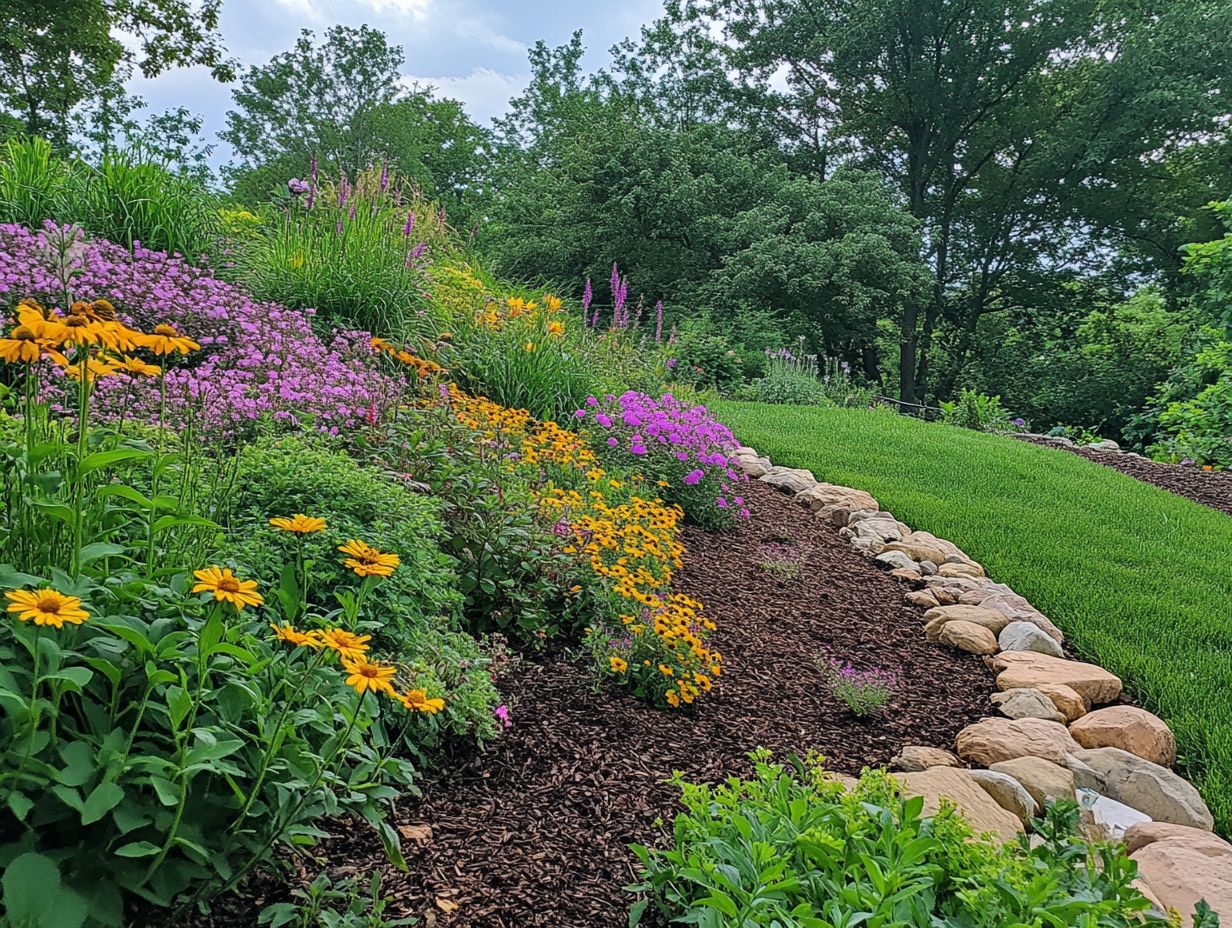
Choosing the right plants and taking care of them is key to helping your soil absorb water and managing runoff.
Pick native plants! They thrive in our environment and support local wildlife.
These plants have extensive root systems that stabilize the soil, reduce erosion, and boost water retention. Applying mulch around them doesn’t just look nice; it also conserves moisture, regulates soil temperature, and keeps weeds at bay.
When you understand the symbiotic relationship between native flora and their environment, you see how vital mulch techniques are. This approach leads to healthier landscapes that require less maintenance while providing sustainable benefits to wildlife.
Effective Watering Techniques
Adopting effective watering techniques is crucial for optimizing water conservation and ensuring your plants get the moisture they need during seasonal rainfall.
Using methods like lawn aeration significantly enhances soil permeability, letting water penetrate deeper into the root zone. This fosters healthier growth and minimizes runoff, making every drop count.
Integrating smart irrigation practices puts technology at your fingertips. You can monitor soil moisture levels and reduce the risk of overwatering. These systems automatically adjust based on weather conditions, ensuring your plants thrive with less water.
Combining modern approaches with traditional methods creates a comprehensive watering strategy that benefits both your landscape and the environment.
Additional Tips for Reducing Water Runoff
To effectively reduce water runoff, consider using erosion control techniques and adding natural mulch to your garden. Additionally, exploring strategies for reducing water usage for garden care can help manage runoff and improve soil health, leading to a stronger ecosystem.
Controlling Erosion
Controlling erosion is essential for managing runoff and alleviating drainage issues. By employing effective strategies, you can safeguard your soil and enhance your landscape’s vitality.
Native plants are a fantastic choice! Their extensive roots anchor the soil and prevent washing away. You might also try strategic landscaping techniques, like building terraces or installing retaining walls, to slow down water flow and improve absorption.
Selecting the right ground cover and placing gravel beds strategically can be pivotal for managing surface runoff, nurturing a sustainable garden ecosystem that flourishes over time.
Using Natural Mulch
Using natural mulch in your garden enhances its beauty while helping retain water and improve soil quality.
This organic layer, made from bark, straw, or leaves, maintains soil moisture by forming a barrier that reduces evaporation. It prevents runoff during heavy rains, allowing water to seep into the ground instead of washing away precious topsoil.
By incorporating this natural element, you create a healthier ecosystem that enriches the soil as it decomposes, delivering essential nutrients for your plants.
The benefits go beyond moisture retention; they create a thriving environment while reducing the need for constant watering and keeping weeds down. It truly becomes a smart choice for sustainable gardening.
Frequently Asked Questions
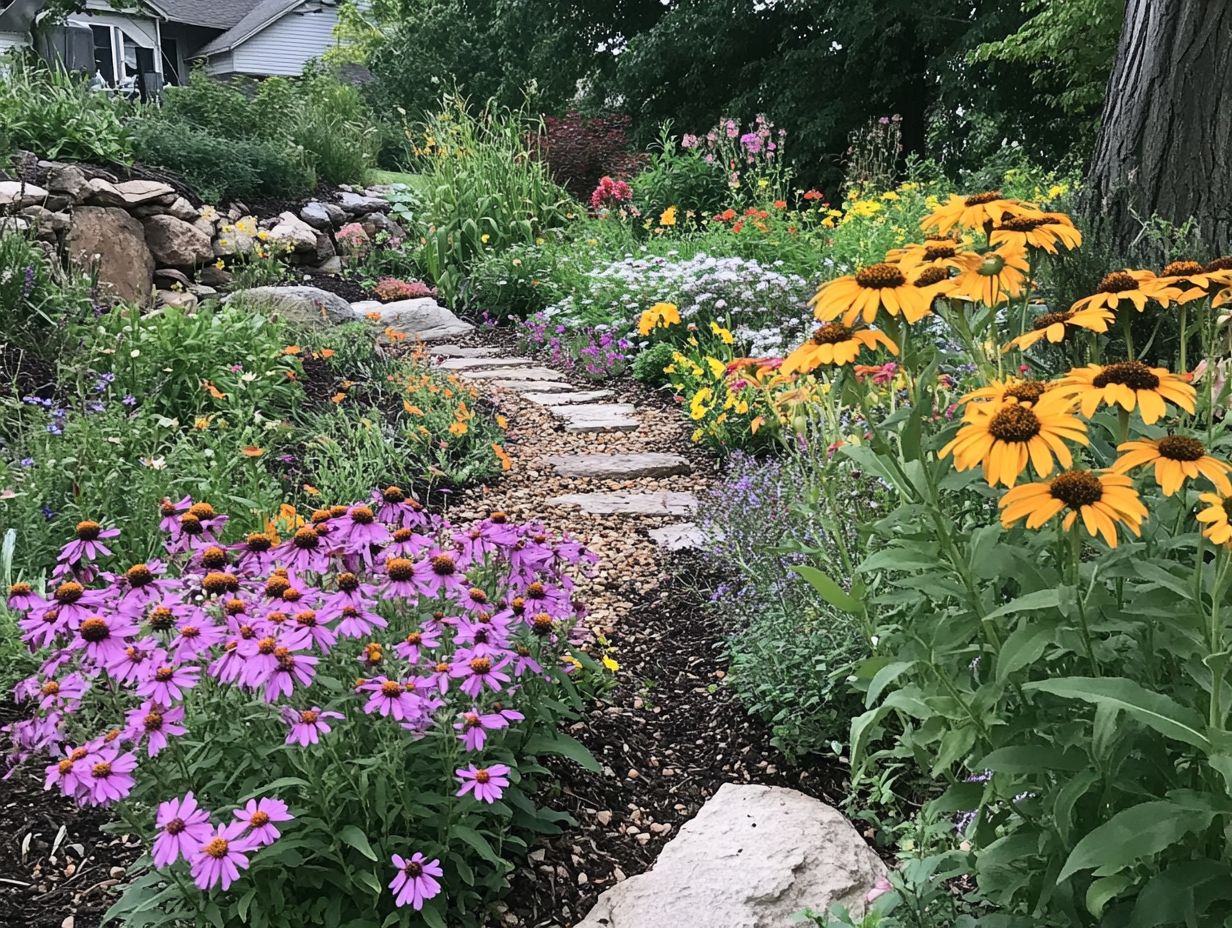
Ever wonder what water runoff is and why you should care?
Water runoff is the excess water that flows off your garden or yard into surrounding areas, like sidewalks, streets, or storm drains. Reducing water runoff in your garden helps conserve water, prevents erosion, and protects the environment.
How can I reduce water runoff in my garden?
To reduce water runoff, use permeable materials for walkways. Plant native plants that require less water and add mulch to keep the soil moist.
What are some landscaping techniques that can help reduce water runoff?
Creating rain gardens, redirecting downspouts to water plants, and using terracing or swales are effective landscaping techniques. They can significantly reduce water runoff.
What are the benefits of reducing water runoff in my garden?
Reducing water runoff not only conserves water but also enhances your garden’s health! It protects nearby rivers and lakes from pollution.
How can I tell if my garden has a problem with water runoff?
You may have a problem with water runoff in your garden if you notice standing water or puddles after it rains. Other signs include brown patches of grass and soil erosion, which indicate that water is not being absorbed properly into the soil.
What are some other ways I can conserve water in my garden?
You can also conserve water by using drip irrigation systems, collecting rainwater, and avoiding overwatering your plants. Choose drought-resistant plants and utilize water-saving techniques like xeriscaping.

